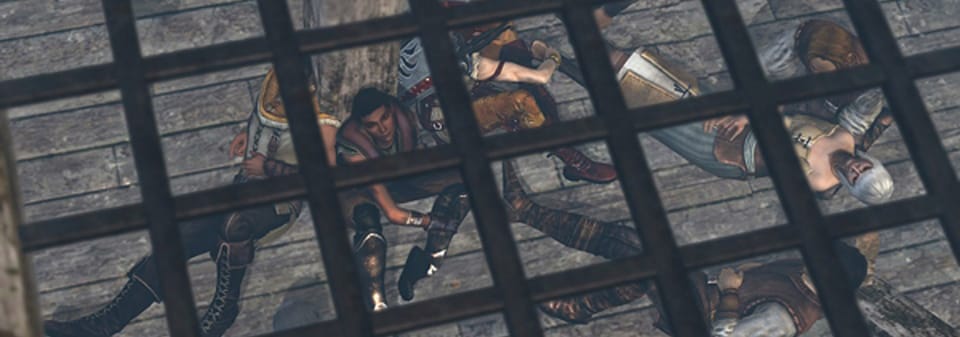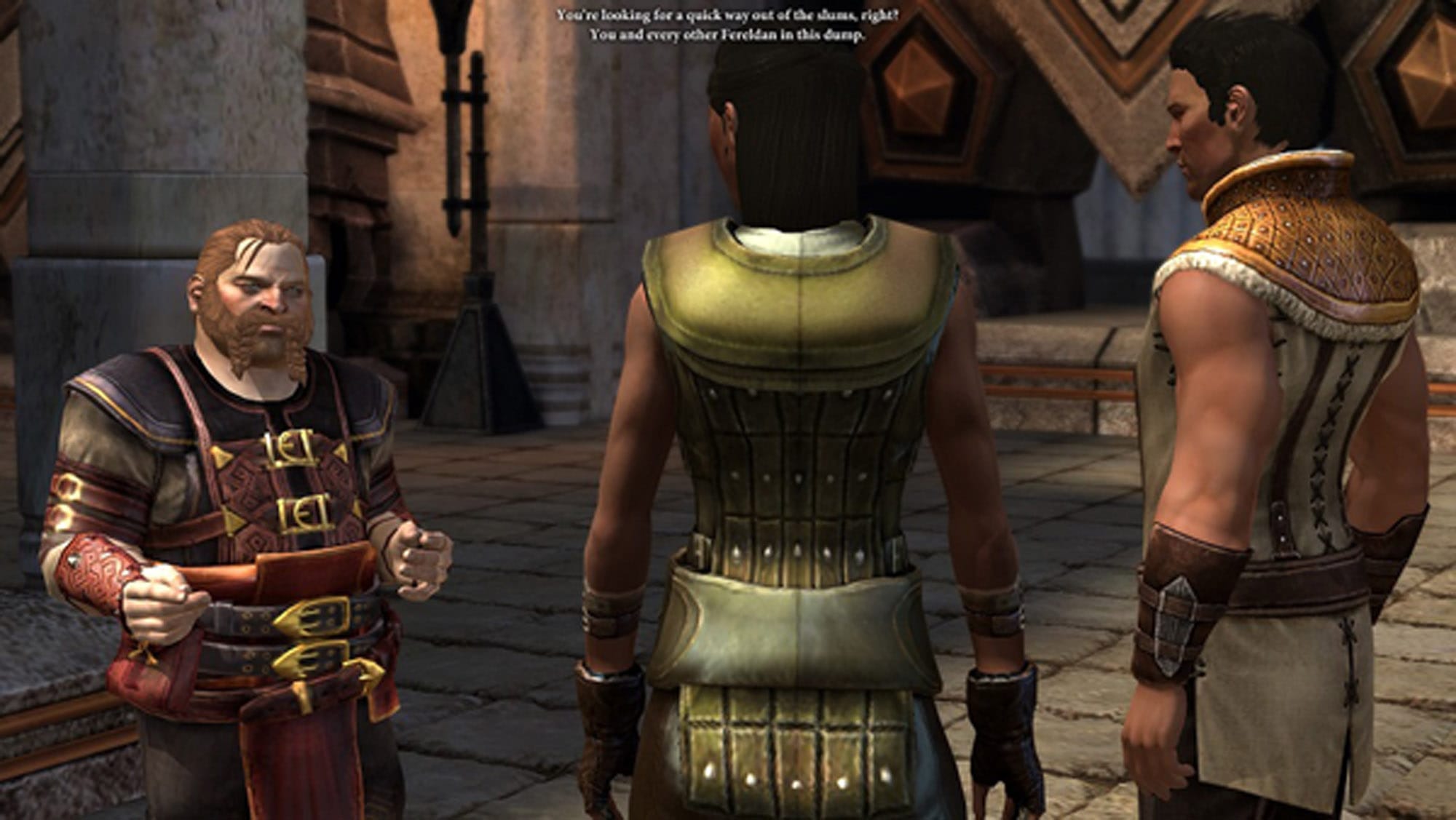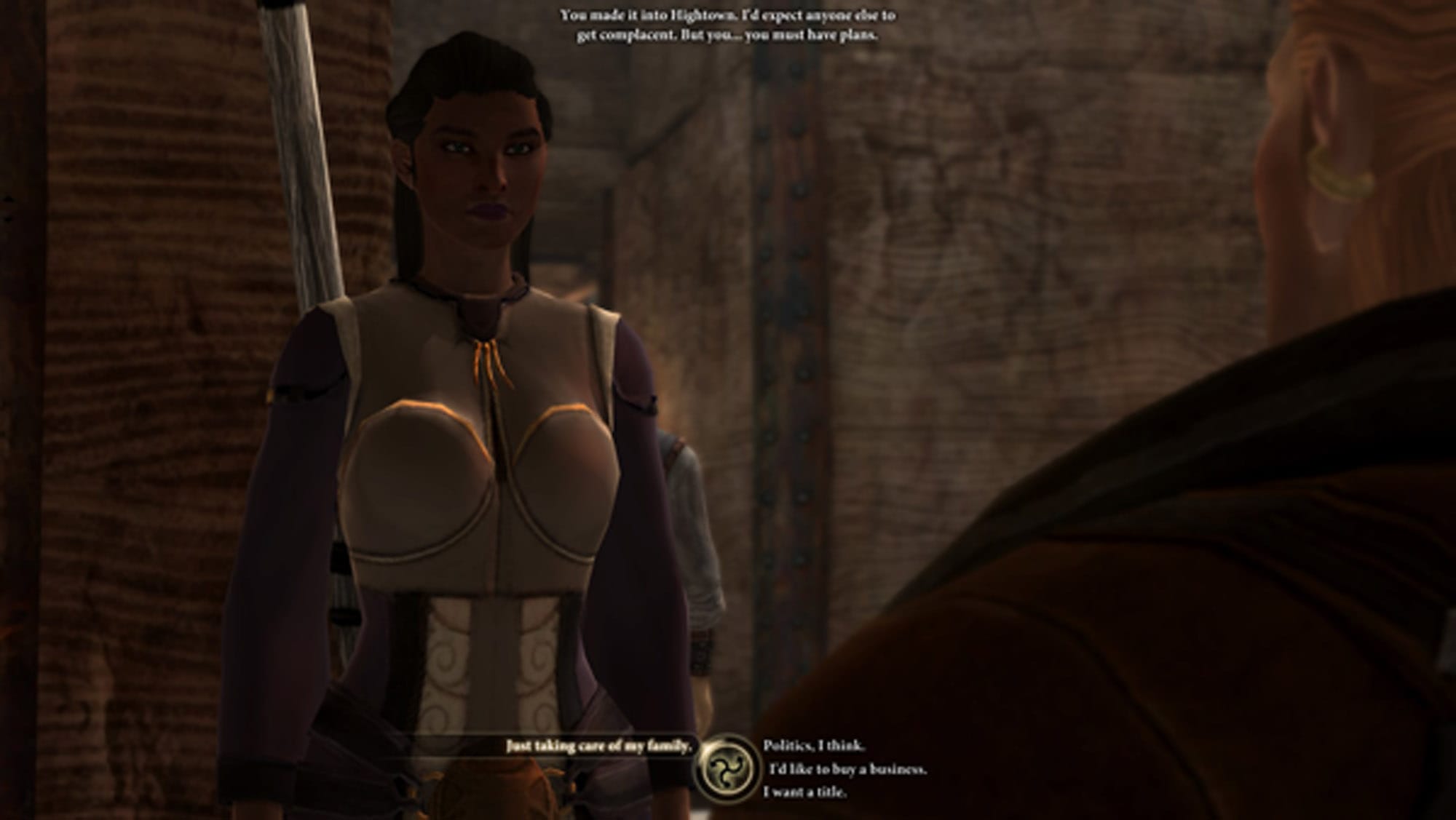Long Way Home: ‘Dragon Age 2’ on Immigration & Identity

This article was written by Sylvia Monreal and originally published on FemHype.
It was brought to us by our friends at Critical Distance, who find the best in critical writing about games each week. You can see more at their site, and support them on Patreon.
///
Dragon Age 2 is the story of immigration. It’s dressed up in the high fantasy that defines the series, but it portrays the struggles of forced migration, acculturation, and xenophobia closely and honestly. In fact, the strengths and weaknesses of the game’s design are far more harmonious when viewed through this lens. The themes of fate and choice, of defining your place in the world of Kirkwall, are the heart of the plot and an immigrant’s journey. In much the same way, you could view the limitations in scope and content as a reflection of the harsh realities of forging a new life from precious few resources.
From the first moments of the game, Hawke is characterized by their migrant status. We’re given precious little information about their life before, because all that matters now is that they must start a new one. In the game’s prologue, narrative and mechanics conspire to push Hawke and their family into the unknown, far away from their home. Fires block paths, a horde of monsters lurks just behind, and the only company on the road are other survivors, just as desperate and lost. Hawke has no choice but to keep moving, further and further away from everything they have known. And they must pay a terrible price for this journey, one that they didn’t even want to take: a sibling; an ally, one that they may even have to kill with their own hands; and their agency, as they are forced to enter a deal with a potentially malevolent force in exchange for safe passage.
Even though this prologue is packaged for the player as a tutorial on controls and an introduction to the game’s larger story, it reflects so much of an immigrant’s struggle. It’s The Blight that drives Hawke away, one of those faceless, generally evil plot devices that you find in fantasy stories like these, but it could have easily been corruption, violence, hopelessness, or one of the many true evils that we find in our world (see: “How This Happened” by LatinoUSA). Worse, the sudden and horrible trauma of the journey is true to life as well (see: The Beast: Riding The Rails And Dodging Narcos On The Migrant Trail by Óscar Martínez). Even Hawke’s precarious deal with Flemeth, a mysterious being that offers aid at an uncomfortable cost, mirrors reality (see: “El coyote” by Radio Ambulante).

Of course, Hawke’s struggles do not end once they reach Kirkwall, a city-state across the ocean from their home country of Ferelden and The Blight. Though Hawke’s life has been consumed by their journey, it does not matter in Kirkwall. The city stands closed to “refugees,” the label applied to everyone from Ferelden, regardless of need or desire. Whoever they were before, however they might personally identify, they are literally marked by their migrant status in Kirkwall, and they are unwanted. However, while Hawke is unwelcomed as a person, their labor is found acceptable, and they enter into indentured servitude in exchange for entrance into the city (along with their remaining sibling and new companion, Aveline). Again, this is a trend we see often in true tales of immigration.
Act One continues to hammer down on these themes, even as the plot expands to include the more fantastical elements of Thedas. More than a few words have been printed about how the act constitutes little more than a series of errands, repetitive maps, and redundant combat—and those takes are not wrong. However, I believe that this portrayal of Kirkwall serves only to further center Hawke’s identity as an immigrant.
Though every Hawke may have different personalities and make different choices, each moves through the first act with the same motivation: securing a home for their mother and protection for them or their sibling. The act is limited to side jobs because Kirkwall is still hostile to refugees even as it continues to hunger for their labor, and so this is the only way that Hawke can interact with their new home. The world is confined to Kirkwall and the surrounding areas because Hawke has no reason, no time, or simply no desire to look beyond what is immediately profitable. Everything in the act single-mindedly drives toward securing a place on the Deep Roads expedition because it promises the status and coin that Hawke will need to provide for their family.
The themes of fate and choice are the heart of the plot and an immigrant’s journey
Beyond this, the beauty of Act One, and with the whole game, really, are the companions that surround Hawke. Each of Hawke’s friends are tinged with Foreign, with Otherness, and each, like Hawke, has to forge their identity with Kirkwall’s culture bearing down on them. Together, they provide a look at the spectrum of acculturation strategies available to Hawke and real-life immigrants. (See: “Immigration, Acculturation, and Adaption” by John W. Berry)
On one end of the spectrum, we have Varric showing how an immigrant can fully integrate into a new society. While Varric is native to Kirkwall, his older brother is an immigrant and their dwarven heritage could’ve put them on the margins of Kirkwall’s human-based society. Still, Varric embraces both cultures as part of his identity and navigates between the two easily and happily. Aveline and, in some cases, Hawke’s sibling, choose to assimilate into Kirkwall, letting go of any previous attachment to develop a new identity centered in Kirkwall; Aveline finds her place in the city guard, and Hawke’s sibling joins one of Kirkwall’s other institutions, the Circle or the Templars.
Anders and Isabela probably could’ve assimilated as easily as Aveline, but they instead choose to separate themselves from Kirkwall in favor of other aspects of their identities. Finally, we have Fenris and Merrill, both of whom have the decision to reject their previous cultures made for them and neither of which is particularly invested in fitting into Kirkwall either. Elves, by and large, are marginalized throughout Thedas, so it makes sense that they would fit here in the spectrum as well.

Though the nuances of Hawke’s acculturation are left to the player, Kirkwall does begin to embrace Hawke—or, at least, tolerate them—by the opening of Act Two, thanks to the riches of the Deep Road. And over the course of the act, we see the xenophobia that had defined Hawke’s life for the past four years finally crumble. Unfortunately, it’s not due to a change in Kirkwall’s mindsets towards immigrants, but a trend reflected in our own history: the pitting of populations against each other in order to uphold the dominant culture (see: How the Irish Became White by Noel Ignatiev). Hawke’s rise in prominence is directly related to their relationship with the Qunari. As they become (by choice or fate) more antagonistic with the Qunari, they are more accepted by Kirkwall, going so far as to become the Champion of the city—but only with the defeat of the Arishok.
Act Three is far more concerned with other elements of the plot, especially those that will lay the foundation for Dragon Age: Inquisition, but we can still feel the lingering influences of Hawke’s identity as an immigrant. Hawke is elevated to the top levels of Kirkwall’s society, where they openly deal with city leaders like the Knight-Commander of the Templars instead of the suspicious merchants of Act One; still, even at this point, Hawke is a tool to be used by the native citizens of Kirkwall. It isn’t until Anders violently upends the existing order of the city that Hawke is given full agency over their decisions and true power to influence their new home.
Dragon Age 2 is a flawed game with numerous valid criticisms to be leveled at its mechanics and narrative. However, at least through metaphor, it tells the story of the challenges and opportunities faced by immigrants with refreshing thoroughness and respect. For me, it will always hold a special place in my heart for giving me the chance to step into the shoes of people like my mother and feel for myself what it’s like to build a new life in an unwelcoming world.
///
This article was written by Sylvia Monreal and originally published on FemHype.
It was brought to us by our friends at Critical Distance, who find the best in critical writing about games each week. You can see more at their site, and support them on Patreon.



